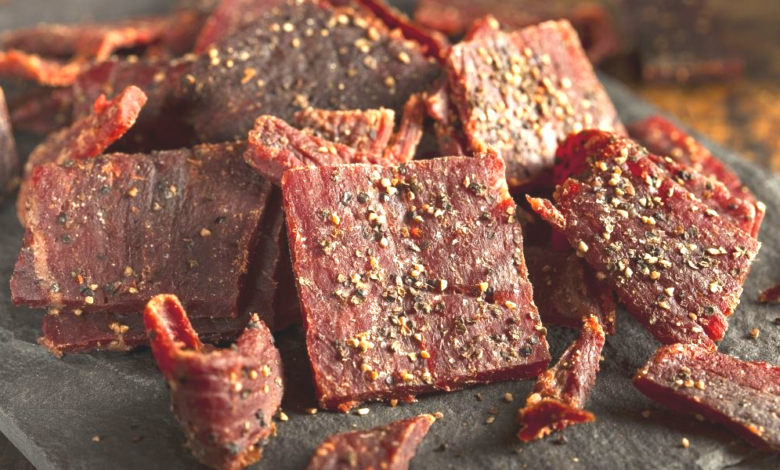The Surprising Health Benefits of Beef Jerky: A Protein-Packed Snack for Optimal Wellness

Beef jerky is a convenient and portable source of protein, but it may also be rich in salt.
The process used to make beef jerky determines whether it’s nutritious or not. Lean strips of dried beef are called beef jerky. Manufacturers often add salt to meat during the drying process to prevent spoilage.
Health Benefits of Beef Jerky
Beef jerky has gained popularity due to the popularity of the paleo and keto diets as well as the increased emphasis on protein among consumers. From a few well-known, established brands, the sector has expanded to include a wide range of alternatives found in convenience shops, health food stores, petrol stations, and farmer’s markets.
Read More : 10 Causes of Bloodshot Eyes and How To Treat Them
A quick and convenient source of iron, zinc, and protein for folks on the move is beef jerky. Conversely, processed red meat with a high salt concentration is also used to make beef jerky. Red and processed meats may raise your risk of health issues, according to some research.Overconsumption of salt may cause weight gain and bloating.
Benefits of Beef Jerky
Studies have shown that dehydrated meat, such as beef jerky, may serve as a convenient and lightweight snack that is rich in protein and important minerals like iron and zinc.
Is an Easy Source of Protein
It might be challenging to get enough protein if you are always on the run. Protein-rich and easily transportable, beef jerky is a great snack option.
Protein is a necessary macronutrient that promotes strong bones, muscles, and skin as well as aids in cell creation and repair. Eating protein on a daily basis is essential since, unlike carbohydrates and fats, your body does not store it.
Your needs for protein are determined by your age, weight, activity level, and sex. A protein target of 10% to 35% of your total calories is advised by some experts. For instance, a person consuming 2,000 calories per day may aim for 100 grams of protein, or around 400 calories.Just one ounce of beef jerky provides over 10% of the recommended daily intake of protein.
Might Support the Immune System
About 25% of the required daily amount of zinc may be found in one ounce of beef jerky. The immune system is supported by zinc, an important element.
The body is more able to absorb zinc from animal sources like beef jerky than from plant-based diets. Nonetheless, having a balanced diet and obtaining zinc from a variety of foods are essential for bolstering your immune system.
Helps Boost Iron Intake
Heme iron may be found in large amounts in beef jerky, according to research. Heme iron is more easily absorbed by the body than non-heme iron, and iron aids in the transportation of oxygen to various body areas.
Iron insufficiency is widespread, particularly among women.Heme iron from beef jerky may be easily obtained and can help prevent iron insufficiency.
Nutrition of Beef Jerky
Each brand’s nutritional information for beef jerky may differ. Typically, a single ounce of beef jerky has the following nutritional benefits of Beef Jerky:
- Calories: 116
- Fat: 7.26g
- Sodium: 505mg
- Carbohydrates: 3.12g
- Fiber: 0.51g
- Added sugars: 2.55g
- Protein: 9.41g
Risks of Beef Jerky
Generally speaking, beef jerky contains a lot of salt. About 20% of the adult recommended daily intake of salt is included in a single one-ounce serving. In the US, nine out of ten Americans eat too much salt.
Consuming too much salt makes the body retain more water, which may cause bloating or weight gain. Overexposure to salt may increase the chance of developing diseases like:
- An enlarged heart
- High blood pressure
- Osteoporosis
- Kidney stones
One kind of processed red meat is beef jerky. Consuming processed red meat may increase your risk of type 2 diabetes, cancer, and cardiovascular disease (CVD), according to some research.
There is evidence that substituting plant-based protein for red meat may lower LDL (or “bad”) cholesterol and other cardiovascular disease risk factors.If you’re attempting to cut down on your red meat intake, there are plenty of plant-based substitutes for beef jerky. One option, for instance, is mushroom jerky, which tastes and feels similar. Jerky made from dried coconut or jackfruit is another option.
Examine the ingredient list when assessing foods that have been packaged, such as beef jerky. Certain brands of beef jerky could include common allergies such barley malt extract (a source of gluten) or soy.Preservatives like sodium nitrite, which are often included in beef jerky, raise the risk of hardened, narrowed arteries and cardiovascular disease.
Search for straightforward, well-known components instead. Think about choices that are Department of Agriculture-certified organic and grass-fed.
Read More : Health Benefits of Eating Watermelon 2024
Tips for Consuming Beef Jerky
A simple snack to include in your diet is beef jerky. You may take it on road trips and hikes because of its portability and extended shelf life. Keep beef jerky refrigerated and packaged tightly.
Conclusion : Benefits of Beef Jerky
A quick and convenient on-the-go snack, beef jerky has high levels of protein, zinc, and iron. The general health of the body depends on certain nutrients.
It’s important to consume beef jerky in moderation since red and processed meats might raise your chance of developing health issues. To keep the meat fresh, beef jerky often has high salt concentration. Overconsumption of salt may cause weight gain and bloating.











